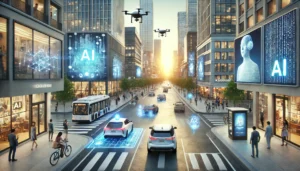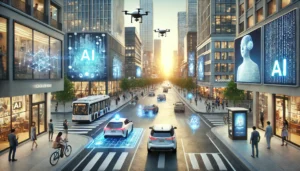Artificial Intelligence in Everyday Life 2025
How Artificial Intelligence is Transforming Everyday Life
Artificial Intelligence (AI) has quietly become an integral part of our daily lives, influencing everything from the way we communicate to how we manage our homes. What was once the stuff of science fiction is now a reality, making our routines more efficient and personalized. Let’s dive into the many ways AI is shaping everyday experiences.
AI-Powered Personal Assistants: Your Digital Sidekick
Virtual assistants like Alexa, Google Assistant, and Siri are more than just gadgets—they’ve become personal helpers. These smart tools can manage schedules, set reminders, answer questions, and even control home devices with simple voice commands. Over time, they learn your preferences, making interactions even smoother.
Beyond voice assistants, AI also powers smart home devices like thermostats and security systems. These gadgets can adjust settings automatically, saving energy and making your home more secure and cost-efficient.
Revolutionizing Healthcare with AI
AI is changing the way we approach health and wellness. Tools like AI-driven imaging systems help doctors detect diseases early, improving outcomes. Meanwhile, wearable devices like fitness trackers monitor heart rate, sleep patterns, and activity levels, offering personalized health insights.
For example, your smartwatch might notice irregularities in your heart rate and prompt you to visit a doctor—potentially saving your life. AI’s role in healthcare is all about providing better care and empowering individuals to take control of their health.
Smarter Transportation for a Smoother Commute
AI makes getting around easier and safer. Apps like Google Maps and Waze use AI to analyze traffic in real time, offering faster routes and estimated travel times.
Self-driving cars, although still developing, are another example of AI’s potential. These vehicles use sensors and AI to navigate roads, avoid obstacles, and adapt to changing conditions. In the near future, they could make roads safer and reduce traffic jams.
Entertainment Tailored Just for You
Have you ever noticed how Netflix or Spotify seems to know exactly what you want to watch or listen to? That’s AI at work. These platforms analyze your habits to recommend content you’ll love, creating a more personalized experience.
In gaming, AI enhances realism by creating dynamic environments and intelligent opponents. Virtual and augmented reality, powered by AI, bring immersive experiences to life, blending the digital and physical worlds.
Transforming Learning with AI
AI is revolutionizing education by adapting to individual learning styles. Platforms like Duolingo use AI to tailor lessons, ensuring users progress at their own pace.
Online classrooms also benefit from AI by automating administrative tasks, giving teachers more time to focus on students. Personalized learning tools help students overcome challenges, making education more accessible and effective for everyone.
Shopping Made Smarter
E-commerce platforms like Amazon rely on AI to create personalized shopping experiences. From recommending products to streamlining checkout, AI makes online shopping seamless.
AI chatbots are another example—they provide instant customer support, answer questions, and even help troubleshoot issues. In physical stores, AI enhances operations by managing inventory and offering tailored in-store experiences.
Finance Gets an AI Upgrade
Banks and financial services are leveraging AI for everything from fraud detection to customer support. AI monitors transactions in real time, flagging suspicious activities and keeping your accounts safe.
Robo-advisors are another innovation, offering personalized investment advice based on market trends and your goals. These tools make financial planning accessible to everyone, regardless of experience.
Boosting Productivity in Workplaces
AI tools like Grammarly help refine written communication, while platforms like Trello and Asana improve task management. By automating repetitive tasks, AI allows professionals to focus on creative and strategic initiatives.
Hiring processes have also become more efficient with AI. It scans resumes, matches candidates to job requirements, and even conducts preliminary interviews, saving time for recruiters and ensuring fairer hiring practices.
Protecting the Planet with AI
AI is a powerful ally in addressing environmental challenges. For instance, climate modeling tools predict weather patterns, helping communities prepare for natural disasters.
In agriculture, AI-driven systems monitor crops, optimize irrigation, and boost yields while minimizing waste. Smart waste management solutions in cities also sort recyclables, contributing to sustainability.
Navigating Challenges and Ethics
Despite its benefits, AI comes with challenges. Privacy concerns, algorithm biases, and fears of job displacement are hot topics. It’s crucial for developers and policymakers to address these issues responsibly.
By focusing on transparency and ethical development, we can ensure AI serves humanity positively. Educating people about responsible AI use is key to overcoming these challenges.
Conclusion: AI is Here to Stay
Artificial Intelligence is no longer just a futuristic concept—it’s a part of our daily lives, making tasks easier, faster, and more personalized. From healthcare to entertainment, transportation to education, AI is transforming how we live and work.
While it’s important to address ethical concerns, there’s no denying the potential AI holds to improve our world. By embracing this technology wisely, we can unlock endless possibilities for a brighter future.







